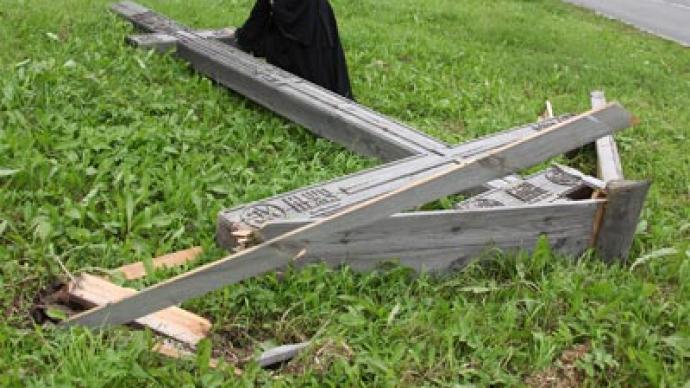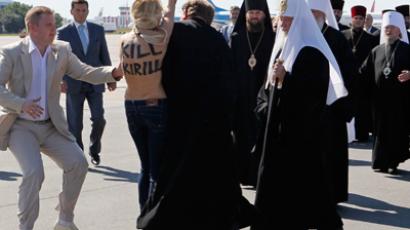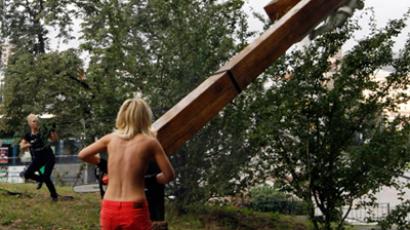Russian Church calls to defend religion from trolling

Believers should be protected from “trolls” by law, both on the internet and in real life, the Russian Orthodox Church’s representative to the Council of Europe says.
“Unfortunately we are often witnessing trolling in real life in the form of various performances, public actions and other activities aimed against religious communities. Such actions have repeatedly taken place in France, Italy, Spain, Norway, Russia, Ukraine and other countries,” Igumen Filipp Ryabykh said.
He was addressing an annual conference in Durres, Albania, held under the aegis of the Council of Europe’s Committee of Ministers.
The Russian cleric said that by trolling he meant breaking into another person’s space of personal freedom in order to inflict maximum damage to people with opposing views. He added that, though the number of anti-church trolls was relatively small, they were launching the actions with maximum insulting and humiliating effect.
“There is a new wave of interference in the believers’ space that is protected by laws on freedom of conscience. Religious symbols installed in various places, religious cemeteries and holy places become targets for such felony,” Ryabykh said.
The priest then told the conference that modern-day events recall the atmosphere of the atheist past of the former Communist countries, as well as the Nazi and Fascist regimes.
“We know from Soviet history that after they hack down crosses and defile synagogues and mosques they start to hack people,” he said.
According to Ryabykh, religious communities, to the contrary, choose peaceful means of spreading their ideals and only use persuasion and positive example.“I call upon the Council of Europe, the member countries and the public to protect legislatively and to secure reliably the freedom of religious people,” Ryabykh said at the end of his speech. Earlier this year the Russian Orthodox Church called upon the country’s authorities to take decisive measures against the owners of websites that contain child pornography and promote illegal drugs or suicide. Russia recently outlawed such sites, but the church suggested going further than simply blocking the pages with the banned information.The head of the Holy Synod's information department, who made the suggestion in the press interview, added that he understood the limitations imposed by the state might be taken as excessive control and encroachment on freedom of speech, but stressed that “my freedom ends where another person’s pain begins.”This statement was one of several in a similar vein, and the Church’s growing desire to affect secular life has already caused opposition in the Russian society. A poll conducted in early August showed that three quarters of Russians wanted the Church to keep away from politics. According to the report by the Russian Public Opinion Research Center (VCIOM), 44 per cent of Russians hold that the Church should deal with morality issues, but stay away from politics. About a third believe the Church’s business should be limited to faith and religious problems. Only 17 per cent of Russians would like clerics to participate actively in sorting out modern society and state problems.But apart from the shifts in public opinion, times are hard for the Russian Orthodox Church at home. Several clerics, including senior ones, and even Patriarch Kirill himself, have been accused of living lives of luxury, having excessive ties with the authorities and attempts to interfere in secular lives. The scandals were often uncovered by bloggers and spread through the internet community before being picked up by conventional media.The church claims the attacks are backed by certain “anti-Christian forces”, but never names those forces directly.The climax of the struggle came over a year ago as several girls calling themselves feminist punk band Pussy Riot held what they called a “punk prayer” in Moscow’s main cathedral. Church workers complained to the police that the show insulted their religious feelings. Three of the participating women were arrested and, after a lengthy trial, were sentenced to two years each for aggravated hooliganism. Russian and international society was divided over the sentence and recently some Russian regions witnessed incidents of vandalism, in which Orthodox crosses were cut down. The vandals later claimed these were signs of support for Pussy Riot. However, the attempts by the Russian Orthodox Church to rein in the criticism on the internet are nothing new from an international perspective. For example, the legislature of the US state of Arizona passed a bill earlier this year that makes internet insults an offense punishable by up to 25 years in jail. The bill was recalled for reconsideration after it caused a wave of protest both by the public and by the Media Coalition — a free speech advocacy group whose members include the Entertainment Software Association, the Motion Picture Association of America and the Recording Industry Association of America.The opposite example could be the Westboro Baptist Church, also in the United States, known for its aggressive pro-Christian internet and real life strategy. For example, this church used the #ThankGodForTheShooter Twitter hashtag to announce the picket against the memorial service for the victims of the recent shooting in a movie theater in Aurora, Colorado. Local residents replied by forming a human wall that shielded the service from the real-life Christian trolls.














